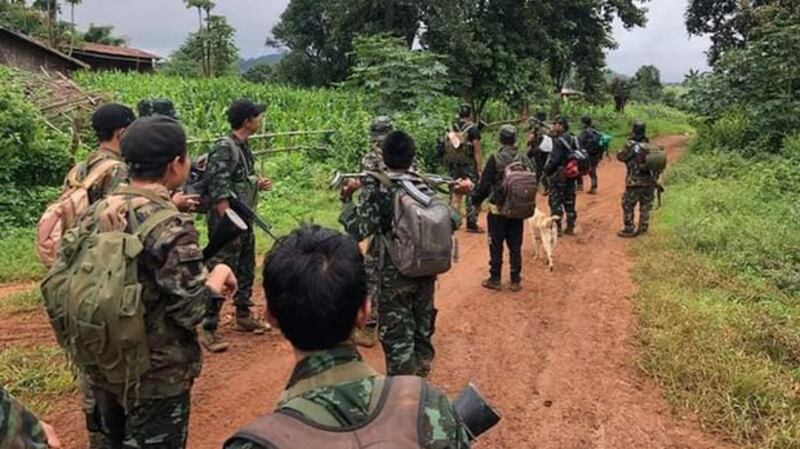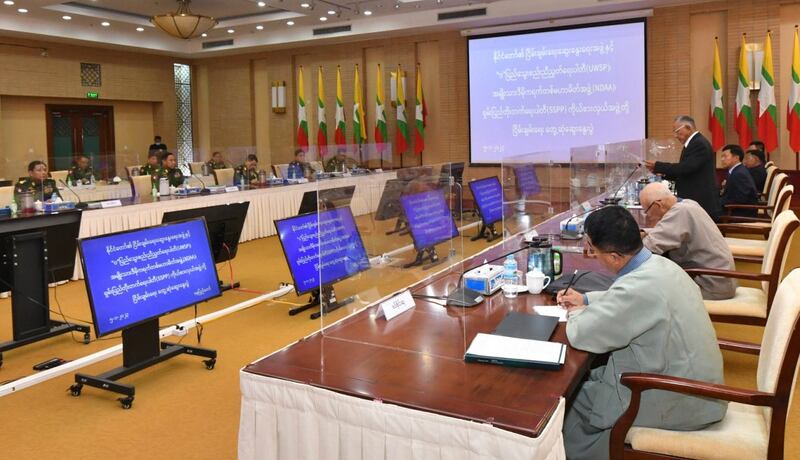Myanmar’s junta has revived a 1977 law that allows civilians it deems “loyal to the state” to own firearms, a move experts worry will escalate violence by arming pro-junta groups fighting armed resistance groups opposed to military rule.
The junta’s Ministry of the Interior issued the order to revive the law on Jan. 31, a day before the second anniversary of the Feb. 1, 2021 coup, according to a leaked junta document and media reports.
The law allows five types of firearms without permits: 9mm pistols and revolvers, 12-gauge or smaller shotguns, hunting rifles, and air guns. Handguns larger than 9mm, assault rifles, and submachine guns can also be owned with a permit.
“This new amendment is designed for a wider range of weapons,” a Yangon-based lawyer told Radio Free Asia’s Burmese Service. “People who want to carry weapons now know what kinds of weapons they are allowed to carry.”
The lawyer, who requested anonymity to speak freely, said that allowing civilians to carry weapons could pose a greater threat to the country's security.
“Now, defense groups such as pro-junta militias … can legally take up arms issued to them by the military,” he said. “This could lead to many other problems related to the misuse of these weapons … and we can’t say it’s enough to simply register the weapons you carry.”
The law says those applying for the right to bear arms must demonstrate “loyalty to the state, a good character, and a need to carry weapons,” with no criminal record or history of mental instability.
Once their application is approved, the law mandates that licensed arms bearers must participate in the “suppression of crime and vice” if directed, and are responsible for “protecting the life and properties of the people” within the framework of the established rules.
The military wants its supporters armed to shore up its fighting forces, said Kaung Thu Win, a leader of the Civil Disobedience Movement, which led widespread protests and strikes in the months following the coup.
“They think that they will get help once they allow their supporters to take up arms. For example, armed pro-junta militias may report the presence of the [resistance] members to the military or fight them on their own,” he said. “By this new policy, the junta has given the pro-junta groups more rights to carry out more forceful attacks on the resistance forces under the law.”

The army has already been arming pro-junta militia groups, said political analyst Than Soe Naing. The law merely legalizes it.
“This new attempt is to arm people … such as members of the [pro-military] Union Solidarity Development Party, low-level civilian administration officials like ward and township administrators and their staff,” he said. “This is because the military junta can no longer guarantee their security and they now have to protect themselves.”
It also means that if ordered, these newly armed people must cooperate in military operations against the resistance.
RFA reached out to Maj. Gen. Zaw Min Tun, the junta spokesman, by phone Monday to inquire about the newly enacted policy, but his phone rang unanswered.
But Zaw Min Tun confirmed to the local “Popular News” media outlet on Monday that the regime will allow those who “adhere to discipline” to own guns.
“There are calls from the people demanding their security,” he said. “We are going to allow the ones who really need to defend themselves, those who are under threat and those who can handle them in a disciplined manner [to bear arms]."
Padoh Man Man, the spokesman of the Karen National Union armed ethnic group’s fifth brigade, said the policy is worrisome because it may lead to unnecessary shootings and killings.
"About 3 years ago, the military adopted a policy for a mandatory military service for citizens 18 years and older, but they could not implement it successfully,” he said. “This new policy is their second attempt to do that. This is really a seriously worrisome situation for our country.”
Organizations on both sides of the political spectrum said that resistance forces are shooting and killing people suspected of being junta informants, while the military is arresting and killing those it accuses of being resistance members.
The military reported that 5,443 government officials, chief administrators, monks, and children were killed across the country between Feb. 1, 2021 and Jan. 25, 2023, and another 4,577 injured.
Thailand’s Assistance Association for Political Prisoners said that, as of Monday, authorities in Myanmar had killed 2,988 civilians throughout the country since the military coup.
Civil war imminent?
Sunday was Union Day in Myanmar, a holiday commemorating the 1947 Panglong agreement which united the various parts of the country prior to its independence from Britain. However, escalating violence means that the country is headed toward a wider civil war, according to a statement by the Peace Process Steering Team, formed by representatives of armed ethnic organizations and tasked with negotiating with the junta for peace.
Junta leader Senior Gen. Min Aung Hlaing said in a Union Day speech that the country is “a long way from peace” due to interference by various local and foreign groups, without providing details.

Saw Mya Raza Lin, the deputy chairman of the Arakan Liberation Party, one of the country’s ethnic armed groups, said that it is time for stakeholders to have an open discussion.
“It’s still necessary to negotiate. We need to have a serious discussion about the constitution, as well as for other sectors,” he said. “The revolution is a protracted feud that will take many years, and those in power may be concerned that the country will be separated into many smaller parts.”
He said ethnic groups want their right to self-determination, so both parties must be transparent in negotiations.
The steering team statement said that the country must solve its current political problems through peaceful means, and suggested that the junta’s power grab had led to a general crisis, including international sanctions.
Last year was supposed to have been the “Year of Peace” after the junta declared a nationwide ceasefire and invited many of the ethnic armed groups for talks. Instead, the junta expanded an offensive against armed resistance groups nationwide, including by ordering airstrikes and artillery strikes.
A meeting of the junta on Jan. 31 revealed that only 198 of Myanmar’s 330 townships are currently “stable,” and that 19,444 battles have been fought since the coup.
According to the United Nations Office for the Coordination of Humanitarian Affairs, 1.5 million people across the country have been forced to flee their homes due to armed conflict and insecurity.
Translated by Myo Min Aung. Edited by Eugene Whong.
